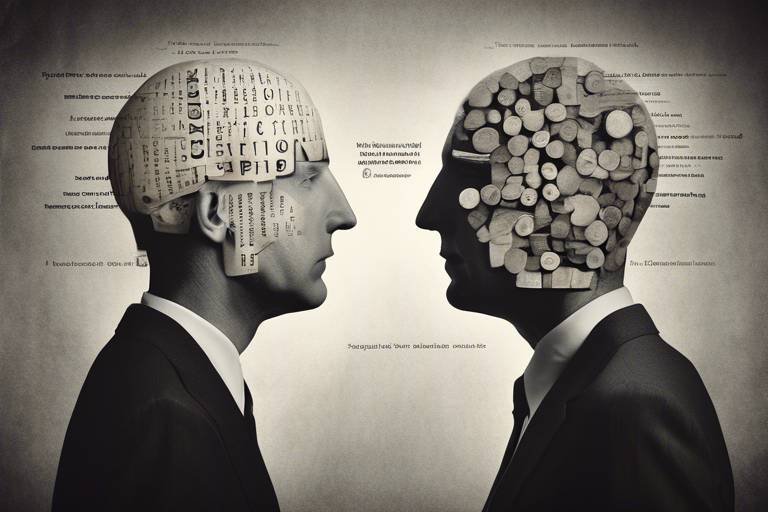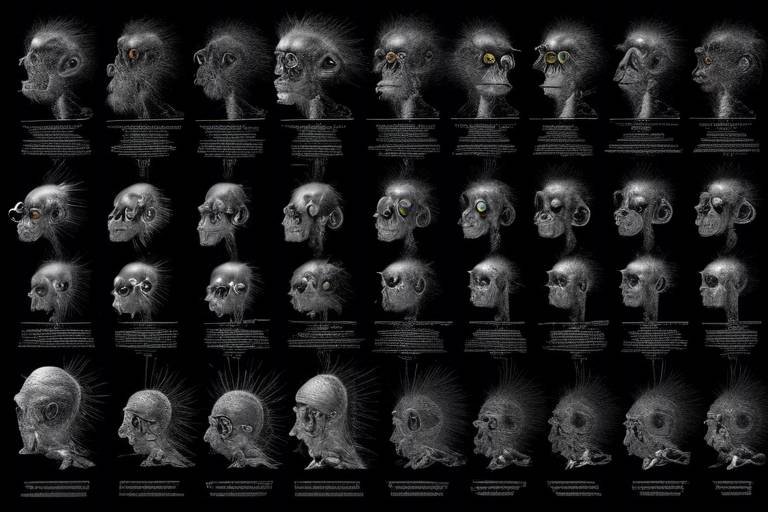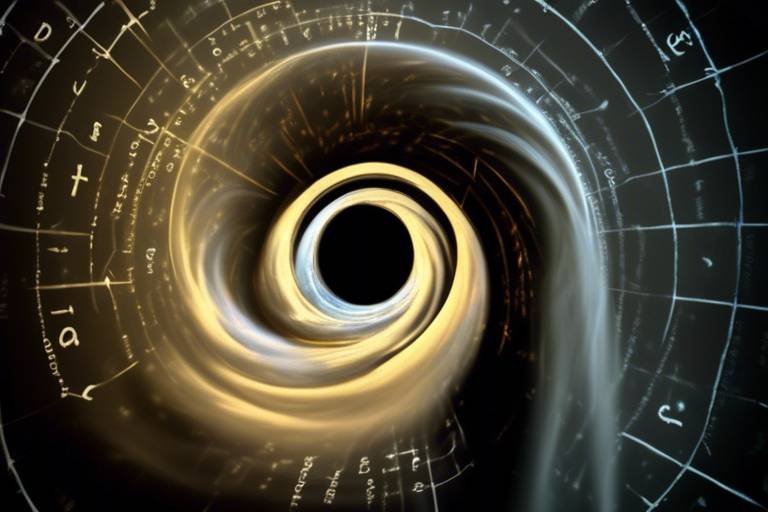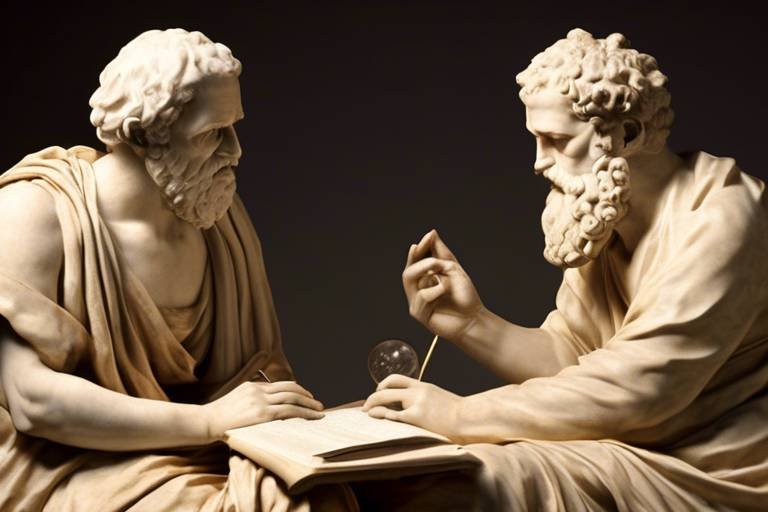Rationalism vs Empiricism - A Never Ending Debate
The clash between rationalism and empiricism has been an enduring theme in the realm of philosophy, captivating thinkers and scholars for centuries. At its core, this debate revolves around the question of how we acquire knowledge and understand the world around us. Is it through the power of reason and innate ideas, or is it through our senses and experiences? This fundamental conflict not only influences philosophical discourse but also shapes our everyday understanding of reality. Imagine two rival teams on a grand stage, each presenting compelling arguments and evidence, yet neither willing to concede. This is the essence of the rationalism vs. empiricism debate—a rich tapestry woven with intricate ideas and profound implications.
Rationalists, like the legendary René Descartes, argue that our intellect is the primary source of knowledge. They believe in the existence of innate ideas—concepts that are hardwired into our minds from birth. Think of it as a blueprint for understanding the universe, where reason serves as the architect. On the flip side, empiricists like John Locke contend that knowledge is derived from sensory experiences. They liken the mind to a blank slate, or tabula rasa, that is filled through observations and interactions with the world. This perspective emphasizes the importance of evidence and experimentation, akin to a scientist meticulously recording data in a lab.
The historical context of this debate is equally fascinating. The Enlightenment period marked a significant turning point, where both rationalist and empiricist ideas flourished and influenced one another. It was a time of great intellectual awakening, where thinkers began to challenge traditional beliefs and seek knowledge through reason and observation. The impact of scientific discoveries during this era cannot be overstated, as they provided a framework for empiricism and challenged the rationalist perspective that relied heavily on abstract reasoning.
As we delve deeper into the contributions of key philosophers from both camps, we discover how their ideas have shaped our understanding of knowledge. From Descartes' famous declaration, "Cogito, ergo sum" (I think, therefore I am), to Locke's theories on the nature of human understanding, the arguments presented by these thinkers continue to resonate today. The debate is not merely academic; it has real-world implications that affect how we approach learning, science, and even ethics.
In summary, the rationalism vs. empiricism debate is a captivating exploration of the nature of knowledge itself. It raises profound questions about the essence of reality and how we come to understand it. Whether you lean towards the rationalist belief in innate ideas or the empiricist emphasis on sensory experiences, one thing is certain: this philosophical conflict will continue to inspire discussion and inquiry for generations to come.
- What is rationalism? Rationalism is the philosophical view that reason and intellect are the primary sources of knowledge, emphasizing innate ideas and deductive reasoning.
- What is empiricism? Empiricism asserts that knowledge arises from sensory experience and observation, highlighting the importance of evidence and experimentation.
- Who are some key rationalist philosophers? Notable rationalist philosophers include René Descartes and Baruch Spinoza, who made significant contributions to the development of rationalist thought.
- Who are some key empiricist philosophers? Influential empiricist philosophers include John Locke and David Hume, who argued for the primacy of sensory experience in knowledge acquisition.
- How did the Enlightenment impact the debate? The Enlightenment was a pivotal era that shaped modern philosophy, allowing rationalism and empiricism to emerge and interact in transformative ways.

Defining Rationalism
Rationalism is a fascinating philosophical approach that asserts that reason and intellect are the primary sources of knowledge. Unlike empiricism, which relies heavily on sensory experience, rationalism emphasizes the importance of innate ideas and deductive reasoning. Imagine trying to solve a complex puzzle without any pieces; rationalists believe that our minds possess certain fundamental concepts that help us make sense of the world around us. This perspective encourages us to trust our reasoning abilities, suggesting that through logical deduction, we can arrive at truths that are not necessarily observable.
At its core, rationalism posits that knowledge is not merely a product of our experiences but is instead rooted in the very structure of our minds. This idea can be quite liberating, as it means that we can uncover truths about existence, morality, and the universe without relying solely on what we see or hear. Think of it like having a map in your mind that guides you through the complexities of life, allowing you to navigate without getting lost in the chaos of sensory overload.
Key proponents of rationalism include notable philosophers such as René Descartes and Baruch Spinoza. These thinkers laid the groundwork for rationalist thought, arguing that certain truths are self-evident and can be discovered through reason alone. For instance, Descartes famously declared, "Cogito, ergo sum" (I think, therefore I am), which highlights the importance of self-awareness and rational thought as the foundation of knowledge. Spinoza, on the other hand, expanded on these ideas by advocating for a monistic view of the universe, suggesting that everything is interconnected through a single substance.
To better understand rationalism, let’s break down its core principles:
- Innate Ideas: Rationalists argue that certain concepts, such as mathematics and ethics, are hardwired into our minds.
- Deductive Reasoning: This method involves starting with general principles and deducing specific truths from them.
- Trust in Reason: Rationalists believe that reason is the most reliable tool for acquiring knowledge, often more so than sensory experience.
In summary, rationalism invites us to explore the depths of our reasoning capabilities. It challenges us to look beyond the surface and trust in the power of our intellect to uncover profound truths about existence. As we delve deeper into this philosophical tradition, we begin to appreciate the intricate dance between reason and experience, a theme that will continue to resonate throughout the ages.

Defining Empiricism
Empiricism is a philosophical stance that emphasizes experience and observation as the primary sources of knowledge. Unlike rationalism, which relies heavily on reason and innate ideas, empiricism argues that our understanding of the world is fundamentally shaped by what we can perceive through our senses. Imagine trying to learn about the world without ever stepping outside or seeing anything; that’s essentially what rationalism proposes. In contrast, empiricists believe that knowledge is built through interaction with the environment, making sensory experience the cornerstone of understanding.
At the heart of empiricism lies the idea that all knowledge begins with sensation. This means that everything we know about the world is derived from what we can see, hear, touch, taste, and smell. Consider how a child learns about fire; they don’t simply know it’s hot because someone told them. Instead, they learn through experience—perhaps by touching a hot stove and feeling the burn. This experiential learning is what empiricists advocate as the most reliable way to acquire knowledge.
Empiricism can be broken down into several foundational principles, which include:
- Tabula Rasa: The idea that individuals are born as a blank slate, and knowledge is written on this slate through experience.
- Inductive Reasoning: The process of drawing general conclusions from specific observations. For instance, if you observe that the sun rises every morning, you might conclude that it will rise again tomorrow.
- Verification: The belief that for a statement to be meaningful, it must be verifiable through sensory experience. If you can't observe it, it’s not considered knowledge.
Influential thinkers like John Locke and David Hume championed these principles, arguing against the rationalist perspective that innate ideas exist independently of experience. Locke famously proposed the concept of tabula rasa, suggesting that our minds are like blank slates at birth, shaped entirely by our experiences. Hume took this a step further by questioning the very nature of causation, arguing that we can never observe causation directly, only sequences of events, which leads to a more skeptical view of knowledge.
Empiricism has profound implications for various fields, especially in the realm of science. The scientific method, which relies on observation and experimentation, is deeply rooted in empiricist philosophy. Scientists formulate hypotheses based on observations, test them through experiments, and draw conclusions based on the data collected. This approach has led to groundbreaking discoveries and advancements in technology, reinforcing the idea that knowledge is best acquired through empirical means.
In summary, empiricism offers a lens through which we can understand the world, firmly rooting knowledge in sensory experience. It challenges us to question how we come to know what we know and emphasizes the importance of observation in the quest for truth. As we delve deeper into the philosophical debate between rationalism and empiricism, it becomes clear that these contrasting views not only shape our understanding of knowledge but also influence the very fabric of our intellectual pursuits.

Key Rationalist Philosophers
When diving into the world of rationalism, it’s impossible to overlook the towering figures who shaped its foundation. These philosophers didn’t just dabble in ideas; they carved out a whole new way of thinking about knowledge and existence. Let’s explore a couple of the most influential rationalist thinkers: René Descartes and Baruch Spinoza. Their contributions continue to resonate in modern philosophical discourse.
René Descartes, often hailed as the father of modern philosophy, revolutionized our understanding of knowledge through his method of doubt. He famously stated, “Cogito, ergo sum” (I think, therefore I am), which emphasizes the act of thinking as proof of existence. Descartes argued that certain truths could be known through reason alone, independent of sensory experience. He believed that the mind holds innate ideas that can be uncovered through rational thought. This was a radical departure from the prevailing views of his time, which often prioritized empirical observation. Descartes' approach laid the groundwork for a systematic philosophy that sought to establish a firm foundation for scientific inquiry.
Next up is Baruch Spinoza, who took Descartes' ideas and expanded upon them in profound ways. Spinoza is known for his monistic view of the universe, where he posited that everything is interconnected and part of a single substance, which he referred to as God or Nature. His rationalist philosophy emphasized that understanding the universe requires a blend of reason and ethical living. Spinoza challenged the notion of a personal God, arguing instead for a more abstract, impersonal force that governs the universe. This perspective not only influenced rationalism but also laid the groundwork for later philosophical movements, including pantheism and even certain strands of modern science.
Both Descartes and Spinoza played pivotal roles in the evolution of rationalist thought. Their ideas sparked debates that would shape the trajectory of Western philosophy. To illustrate their differences and similarities, consider the following table:
| Philosopher | Main Ideas | Contribution to Rationalism |
|---|---|---|
| René Descartes | Methodological skepticism, innate ideas, "Cogito, ergo sum" | Established a foundation for modern philosophy and scientific inquiry |
| Baruch Spinoza | Monism, God or Nature, interconnectedness | Expanded rationalism into ethics and the nature of existence |
In conclusion, the contributions of Descartes and Spinoza not only highlight the diversity within rationalist philosophy but also showcase how their ideas continue to influence contemporary thought. Their legacies remind us that the quest for knowledge is not just about what we observe, but also about how we think and reason through the complexities of existence.
What is rationalism? Rationalism is a philosophical viewpoint that emphasizes reason and intellect as the primary sources of knowledge, often asserting that certain ideas are innate and can be understood through deductive reasoning.
Who are the key figures in rationalism? The key figures in rationalism include René Descartes, Baruch Spinoza, and Gottfried Wilhelm Leibniz, among others. Each contributed unique perspectives that shaped the development of rationalist thought.
How does rationalism differ from empiricism? While rationalism asserts that knowledge comes from reason and innate ideas, empiricism claims that knowledge is derived from sensory experience and observation. This fundamental difference fuels the ongoing debate between these two philosophical schools.

René Descartes' Contributions
René Descartes, often hailed as the father of modern philosophy, made monumental contributions that have shaped the trajectory of philosophical inquiry. His approach to knowledge was revolutionary, as he sought to establish a foundation for scientific understanding based on reason rather than tradition. One of his most significant ideas is encapsulated in the famous phrase, "Cogito, ergo sum", which translates to "I think, therefore I am." This assertion underscored the importance of doubt and questioning as essential tools for acquiring knowledge.
Descartes introduced the concept of methodological skepticism, which involves doubting the veracity of all beliefs until they can be proven beyond a reasonable doubt. This method not only paved the way for the scientific method but also encouraged a shift away from reliance on sensory experiences, which he deemed unreliable. Instead, Descartes argued that reason is the primary source of knowledge, leading to the development of rationalism as a philosophical doctrine.
His work, Meditations on First Philosophy, is a cornerstone of rationalist thought. In this text, Descartes meticulously dismantles preconceived notions and rebuilds knowledge based on clear and distinct ideas. He posits that certain truths are innate and can be accessed through reason alone. This idea of innate knowledge was a significant departure from the prevailing empiricist views of his time, which emphasized sensory experience as the foundation of knowledge.
Furthermore, Descartes made remarkable contributions to mathematics and science, particularly through his development of Cartesian coordinates. This system allowed for the representation of geometric shapes in algebraic equations, bridging the gap between geometry and algebra. His mathematical innovations not only advanced the field but also provided a framework for scientific exploration that relied heavily on rational thought.
In summary, Descartes' contributions are pivotal in understanding the evolution of philosophy. His emphasis on reason, skepticism, and innate ideas has laid the groundwork for modern philosophical discourse and continues to influence contemporary thought. Through his revolutionary ideas, Descartes challenged the norms of his time, inviting future generations to question, analyze, and seek knowledge through rational inquiry.
- What is the significance of "Cogito, ergo sum"?
This phrase highlights the fundamental certainty of one's existence through the act of thinking, establishing a basis for knowledge derived from reason. - How did Descartes influence the scientific method?
His methodological skepticism encouraged a systematic approach to inquiry, emphasizing experimentation and rationality over reliance on sensory perception. - What are innate ideas according to Descartes?
Innate ideas are concepts that are not derived from experience but are inherent in the human mind, accessible through reason.

Cogito, ergo sum.
This article explores the fundamental philosophical conflict between rationalism and empiricism, examining their definitions, key proponents, historical context, and implications for knowledge acquisition and understanding the world.
Rationalism posits that reason and intellect are the primary sources of knowledge, emphasizing innate ideas and deductive reasoning. This section delves into its core principles and notable philosophers who championed this viewpoint.
Empiricism asserts that knowledge arises from sensory experience and observation. This section outlines its foundational concepts and highlights influential thinkers who supported empirical methods of understanding reality.
This section discusses prominent rationalist philosophers such as René Descartes and Baruch Spinoza, exploring their contributions to the development of rationalist thought and how they shaped the discourse on knowledge.
René Descartes, often called the father of modern philosophy, introduced the idea of methodological skepticism and the famous dictum Cogito, ergo sum. This section examines his influence on rationalist philosophy.
Baruch Spinoza expanded on Descartes' ideas, advocating for a monistic view of the universe. This section highlights his philosophical contributions and their implications for rationalism.
This section focuses on influential empiricist philosophers like John Locke and David Hume, detailing their arguments for sensory experience as the basis of knowledge and how they challenged rationalist perspectives.
Understanding the historical backdrop of rationalism and empiricism provides insight into their evolution. This section explores the philosophical landscape during the Enlightenment and the impact of scientific discoveries.
The Enlightenment was a pivotal era that shaped modern philosophy. This section discusses how rationalism and empiricism emerged and interacted during this transformative period in intellectual history.
Scientific advancements played a crucial role in the rationalism vs. empiricism debate. This section examines how empirical methods influenced scientific inquiry and challenged traditional rationalist views of knowledge.
The phrase Cogito, ergo sum, which translates to "I think, therefore I am," is a cornerstone of René Descartes' philosophy. This statement encapsulates the essence of rationalist thought, asserting that the very act of thinking is proof of one's existence. Descartes arrived at this conclusion through a process of radical doubt, where he questioned everything he believed to be true until he reached the undeniable fact that he was, indeed, thinking. This profound realization not only fortified his own existence but also laid the groundwork for modern philosophy.
In a sense, Cogito, ergo sum serves as a mental anchor in a sea of skepticism. It emphasizes that while all external realities can be doubted, the existence of the self as a thinking entity cannot. This idea has profound implications, as it shifts the focus from the external world to the internal realm of thought and consciousness. Descartes' assertion challenges us to consider the nature of existence and our place in the universe, inviting us to reflect on our own thoughts and beliefs.
Moreover, this statement has sparked extensive debate and analysis over the centuries. Philosophers have pondered questions such as:
- What constitutes the self?
- Can existence be proven without thought?
- How does this relate to our understanding of consciousness?
Ultimately, Cogito, ergo sum is not just a philosophical assertion; it is an invitation to engage in deeper inquiry about our own existence and the nature of reality itself.
- What is the main difference between rationalism and empiricism?
Rationalism emphasizes reason and innate ideas as the primary sources of knowledge, while empiricism focuses on sensory experience and observation. - Who are some key figures in rationalism?
Notable rationalist philosophers include René Descartes, Baruch Spinoza, and Gottfried Wilhelm Leibniz. - What role did the Enlightenment play in this debate?
The Enlightenment was a transformative period that fostered the development and interaction of both rationalist and empiricist ideas, shaping modern philosophy. - How did scientific discoveries impact the debate?
Scientific advancements reinforced empirical methods and challenged rationalist views, leading to a more nuanced understanding of knowledge acquisition.

This section examines his influence on rationalist philosophy.
This article explores the fundamental philosophical conflict between rationalism and empiricism, examining their definitions, key proponents, historical context, and implications for knowledge acquisition and understanding the world.
Rationalism posits that reason and intellect are the primary sources of knowledge, emphasizing innate ideas and deductive reasoning. This section delves into its core principles and notable philosophers who championed this viewpoint.
Empiricism asserts that knowledge arises from sensory experience and observation. This section outlines its foundational concepts and highlights influential thinkers who supported empirical methods of understanding reality.
This section discusses prominent rationalist philosophers such as René Descartes and Baruch Spinoza, exploring their contributions to the development of rationalist thought and how they shaped the discourse on knowledge.
René Descartes, often called the father of modern philosophy, introduced the idea of methodological skepticism and the famous dictum Cogito, ergo sum. This section examines his influence on rationalist philosophy.
Descartes' approach to philosophy was revolutionary; he sought to establish a foundation for scientific knowledge that was beyond doubt. By employing a method of systematic skepticism, he questioned everything he believed to be true until he arrived at something that could not be doubted: his own existence as a thinking being. This realization not only marked a significant pivot in philosophical thought but also laid the groundwork for a rationalist framework that prioritized reason over sensory experience.
His influence is pervasive in various aspects of rationalist philosophy. For instance, Descartes argued that certain ideas are innate, meaning they are part of our human nature, rather than learned through experience. This belief in innate ideas directly contrasts with empirical thought, which asserts that all knowledge comes from sensory experience. His work, particularly in Meditations on First Philosophy, serves as a critical reference point for understanding the rationalist perspective.
Moreover, Descartes' emphasis on mathematics and geometry as models for clear and distinct knowledge has inspired countless philosophers and scientists. He believed that the universe could be understood through rational inquiry and logical deduction, which has led to significant advancements in fields such as physics and mathematics. His famous phrase "I think, therefore I am" encapsulates the essence of rationalism: the act of thinking is proof of existence, emphasizing the primacy of reason in the quest for knowledge.
Baruch Spinoza expanded on Descartes' ideas, advocating for a monistic view of the universe. This section highlights his philosophical contributions and their implications for rationalism.
This section focuses on influential empiricist philosophers like John Locke and David Hume, detailing their arguments for sensory experience as the basis of knowledge and how they challenged rationalist perspectives.
Understanding the historical backdrop of rationalism and empiricism provides insight into their evolution. This section explores the philosophical landscape during the Enlightenment and the impact of scientific discoveries.
The Enlightenment was a pivotal era that shaped modern philosophy. This section discusses how rationalism and empiricism emerged and interacted during this transformative period in intellectual history.
Scientific advancements played a crucial role in the rationalism vs. empiricism debate. This section examines how empirical methods influenced scientific inquiry and challenged traditional rationalist views of knowledge.
- What is the main difference between rationalism and empiricism?
Rationalism emphasizes reason and innate ideas as the primary sources of knowledge, while empiricism focuses on sensory experience and observation. - Who are the key figures in rationalism?
Key figures include René Descartes and Baruch Spinoza, who contributed significantly to the development of rationalist thought. - How did the Enlightenment influence rationalism and empiricism?
The Enlightenment fostered an environment of intellectual exploration, allowing both rationalist and empiricist ideas to flourish and challenge each other. - What role do scientific discoveries play in this debate?
Scientific discoveries have often validated empirical methods, leading to challenges against traditional rationalist views of knowledge acquisition.

Baruch Spinoza's Ideas
Baruch Spinoza, a towering figure in the realm of rationalism, took the philosophical torch lit by René Descartes and illuminated it with his unique perspective. Born in Amsterdam in 1632, Spinoza's life was as fascinating as his ideas. He was a man who challenged the norms of his time, advocating for a monistic view of the universe, which posited that everything is part of a single substance, often referred to as God or Nature. This radical approach not only set him apart from his contemporaries but also laid the groundwork for modern philosophical thought.
Spinoza's philosophy revolves around the idea that everything in the universe is interconnected. He argued that the mind and body are not separate entities but rather two attributes of the same substance. This perspective was revolutionary, as it paved the way for a more integrated understanding of human existence and the cosmos. Spinoza famously stated, "God is substance, and substance is God," emphasizing that the divine is not an external force but rather inherent in everything around us.
One of Spinoza's most significant contributions was his rejection of Cartesian dualism, which posited a strict separation between mind and body. Instead, he proposed that the mind and body interact in a way that reflects the unity of all things. This idea can be likened to a dance where each partner influences the other's movements, creating a harmonious relationship. For Spinoza, understanding this relationship was crucial for achieving true knowledge and insight into the nature of reality.
Spinoza also emphasized the importance of reason as a means to attain knowledge. He believed that through rational thought, individuals could uncover the underlying truths of existence. His work, Ethics, is a systematic exploration of this idea, where he lays out his vision of how human beings can achieve happiness and freedom through understanding their place within the universe. In this text, he outlines several key concepts:
- Conatus: The innate drive of each being to persist in its existence.
- Affect: The emotions and feelings that arise from our interactions with the world.
- Intellectual Love of God: The highest form of knowledge, where one experiences a deep connection to the universe.
Spinoza's ideas were not without controversy. His views challenged the religious orthodoxy of his time, leading to his excommunication from the Jewish community. However, his courage to question established beliefs has made him a pivotal figure in the history of philosophy. His work not only influenced later thinkers like Friedrich Nietzsche and Albert Einstein but also laid the groundwork for the Enlightenment's emphasis on reason and individualism.
In conclusion, Baruch Spinoza's ideas represent a profound shift in philosophical thought. By advocating for a unified understanding of the universe and emphasizing the power of reason, he opened new pathways for knowledge and understanding. His legacy continues to resonate today, reminding us that the quest for knowledge is a journey worth undertaking, one that invites us to explore the depths of existence with both curiosity and courage.
Q: What is Spinoza's main philosophical idea?
A: Spinoza's main idea is that everything in the universe is interconnected, and he advocated for a monistic view where God and Nature are seen as one substance.
Q: How did Spinoza's ideas differ from Descartes?
A: While Descartes emphasized dualism, separating the mind and body, Spinoza proposed that they are two attributes of the same substance, promoting a more integrated understanding of existence.
Q: What is the significance of Spinoza's work, Ethics?
A: In Ethics, Spinoza systematically explores the nature of reality, the importance of reason, and how understanding our place in the universe can lead to happiness and freedom.

Key Empiricist Philosophers
When we dive into the world of empiricism, we encounter a treasure trove of thinkers who have profoundly shaped our understanding of knowledge. At the forefront of this movement are two giants: John Locke and David Hume. These philosophers championed the idea that our knowledge stems from sensory experiences, fundamentally challenging the rationalist perspective that emphasizes innate ideas and reason.
John Locke, often regarded as the father of liberalism, argued that the mind is a tabula rasa or blank slate at birth. According to Locke, all knowledge is derived from experience, which he categorized into two types: sensation and reflection. Sensation involves the direct interaction with the world through our senses, while reflection pertains to the internal processes of the mind. This idea is encapsulated in his famous work, An Essay Concerning Human Understanding, where he meticulously outlines how our ideas are formed through these experiences. Locke's emphasis on empirical evidence laid the groundwork for modern scientific inquiry, showing that our understanding of the world is not preordained but constructed through interaction with it.
Following in Locke's footsteps, David Hume took empiricism to new heights. Hume is best known for his skepticism regarding causation and the nature of reality. He argued that our beliefs about cause and effect are not derived from reason but from habit and experience. For Hume, the human mind is limited and cannot access the true nature of reality; instead, we can only know things as they appear to us through our senses. His seminal work, A Treatise of Human Nature, challenges the rationalist notion of certainty and posits that much of what we consider knowledge is merely a product of our experiences and perceptions. Hume's radical empiricism pushed the boundaries of philosophical thought, urging us to question the very foundations of what we deem to be 'knowable.'
To illustrate the contributions of these key empiricist philosophers, let’s take a look at a comparative table:
| Philosopher | Main Ideas | Key Works |
|---|---|---|
| John Locke | Mind as a blank slate; knowledge through sensation and reflection | An Essay Concerning Human Understanding |
| David Hume | Skepticism about causation; knowledge based on habit and experience | A Treatise of Human Nature |
Both Locke and Hume significantly impacted how we perceive knowledge acquisition today. Their ideas resonate through various fields, including psychology, education, and even the natural sciences. By emphasizing the importance of experience, they fostered a shift from abstract reasoning to a more grounded approach to understanding the world.
In conclusion, the contributions of these key empiricist philosophers have not only enriched philosophical discourse but have also laid the foundation for the scientific method. Their insistence on the primacy of sensory experience continues to influence contemporary thought and debates about the nature of knowledge. As we explore the broader implications of empiricism in the context of rationalism, we gain a deeper appreciation for the ongoing dialogue between these two philosophical perspectives.

The Historical Context of the Debate
The philosophical conflict between rationalism and empiricism didn't arise in a vacuum; it was deeply influenced by the historical context of its time. To truly grasp the essence of this debate, we need to take a step back and examine the intellectual landscape of the Enlightenment period, a time characterized by a surge of scientific discovery and philosophical inquiry. This era, spanning the 17th and 18th centuries, was crucial in shaping modern thought and laid the groundwork for the arguments that would come to define rationalism and empiricism.
During the Enlightenment, thinkers began to challenge traditional authority and question long-standing beliefs. The rise of scientific inquiry led to a newfound emphasis on observation and experimentation. As a result, philosophers started to explore how knowledge was acquired, leading to the emergence of both rationalist and empiricist schools of thought. While rationalists like Descartes argued that knowledge could be derived from innate ideas and logical deduction, empiricists like Locke countered that all knowledge comes from sensory experiences. This clash of ideas was not just an academic exercise; it reflected the broader societal shifts of the time.
Furthermore, the impact of scientific discoveries during this period cannot be overstated. The scientific revolution, marked by figures such as Galileo and Newton, introduced methodologies that emphasized observation and empirical evidence. These advancements posed significant challenges to rationalist perspectives, which often relied on abstract reasoning without the necessity of empirical validation. The interplay between these two philosophies was evident in the works of many Enlightenment thinkers, who sought to reconcile the two approaches or argue for the superiority of one over the other.
To illustrate the key developments during this period, consider the following table that highlights some of the major figures and their contributions to the debate:
| Philosopher | Philosophical Approach | Key Contribution |
|---|---|---|
| René Descartes | Rationalism | Methodological skepticism and "Cogito, ergo sum." |
| John Locke | Empiricism | The theory of tabula rasa (blank slate). |
| David Hume | Empiricism | Critique of causation and the limits of human understanding. |
| Baruch Spinoza | Rationalism | Monistic view of the universe and ethics derived from reason. |
This table encapsulates the essence of the debate, showcasing how different philosophers approached the acquisition of knowledge. The Enlightenment not only fostered a rich intellectual environment but also set the stage for ongoing discussions about the nature of knowledge that continue to this day. As we delve deeper into the implications of these philosophies, it becomes clear that the historical context of the rationalism vs. empiricism debate is not merely a backdrop but a vital component that informs our understanding of these contrasting viewpoints.
- What is the main difference between rationalism and empiricism?
Rationalism emphasizes reason and innate ideas as the primary sources of knowledge, while empiricism asserts that knowledge comes from sensory experience and observation. - Who were the key figures in the rationalism vs. empiricism debate?
Notable rationalists include René Descartes and Baruch Spinoza, while key empiricists include John Locke and David Hume. - How did the Enlightenment influence these philosophical schools?
The Enlightenment encouraged a questioning of traditional beliefs and fostered a focus on scientific inquiry, leading to the development of both rationalist and empiricist thought.

Impact of the Enlightenment
The Enlightenment, often referred to as the Age of Reason, was a monumental period that significantly influenced the trajectory of Western philosophy. This era, spanning the late 17th to the 18th century, was characterized by a surge in intellectual curiosity and a drive to challenge established norms. Philosophers began to prioritize reason and scientific inquiry over tradition and religious dogma. This shift laid the groundwork for the ongoing debate between rationalism and empiricism.
During the Enlightenment, thinkers like John Locke and Immanuel Kant emerged, advocating for ideas that would shape modern thought. Locke, with his emphasis on experience and observation, pushed back against the rationalist notion that knowledge is primarily innate. Instead, he argued that the mind is a tabula rasa (blank slate) at birth, filled through sensory experiences. This perspective not only challenged rationalist views but also paved the way for empirical research methods that dominate scientific inquiry today.
On the other hand, philosophers like Descartes were not entirely sidelined. In fact, the Enlightenment was a battleground where rationalism and empiricism often clashed, each trying to establish its supremacy in the quest for knowledge. The debates that erupted during this time were not merely academic; they had profound implications for society, politics, and education. As reason began to take precedence, the foundations of modern democracy and human rights were laid.
Moreover, the Enlightenment was marked by a growing belief in the power of human reason to solve problems. This belief led to significant advancements in various fields, including science, mathematics, and ethics. The scientific method, which relies heavily on empirical evidence, gained traction and challenged the previously unassailable rationalist dogmas. The interplay between rationalist and empiricist thought during this time created a rich tapestry of ideas that fueled further philosophical inquiries.
To illustrate the impact of the Enlightenment on rationalism and empiricism, consider the following table that highlights key philosophers and their contributions:
| Philosopher | Key Contribution | Philosophical Stance |
|---|---|---|
| René Descartes | Methodological skepticism; "Cogito, ergo sum" | Rationalism |
| John Locke | Tabula rasa; knowledge from sensory experience | Empiricism |
| Immanuel Kant | Synthesis of rationalism and empiricism | Transcendental idealism |
| David Hume | Critique of causation; knowledge through experience | Empiricism |
In summary, the Enlightenment was a critical period that not only shaped the discourse around rationalism and empiricism but also set the stage for modern philosophy. The dynamic interactions between these two schools of thought continue to influence contemporary debates about knowledge and understanding. As we reflect on this era, it becomes clear that the Enlightenment was not just a time of intellectual awakening; it was a revolution in how we perceive the world around us.
- What is the main difference between rationalism and empiricism?
Rationalism emphasizes reason and innate ideas as the primary sources of knowledge, while empiricism focuses on sensory experience and observation. - Who are the key figures associated with rationalism?
Notable rationalist philosophers include René Descartes and Baruch Spinoza. - How did the Enlightenment influence modern philosophy?
The Enlightenment fostered a culture of questioning and scientific inquiry, leading to significant advancements in various fields and shaping contemporary philosophical thought.

Scientific Discoveries and Philosophy
The relationship between scientific discoveries and philosophy has always been a dynamic dance, a back-and-forth exchange that has shaped our understanding of reality. As the empirical method gained traction, the debate between rationalism and empiricism intensified, with each side vying for supremacy in the quest for knowledge. Scientific breakthroughs, particularly during the Enlightenment, acted as a catalyst for this philosophical discourse. They challenged long-held beliefs and prompted thinkers to reassess the sources of knowledge.
For instance, the work of scientists like Galileo Galilei and Isaac Newton revolutionized our understanding of the natural world. Galileo's use of the telescope opened a new realm of observation, allowing humanity to peer into the cosmos and question the geocentric model that had dominated for centuries. This shift wasn't just scientific; it was philosophical. It forced rationalists to reconsider their stance on the nature of knowledge. If observation could reveal truths about the universe, then could reason alone be trusted to uncover all knowledge?
Newton's laws of motion and universal gravitation further solidified the empirical approach, demonstrating that consistent, observable phenomena could explain complex interactions in the universe. This led to a growing acceptance of empiricism as a reliable source of knowledge. The scientific method became the gold standard, emphasizing observation, experimentation, and evidence over abstract reasoning. As a result, rationalists like Descartes found themselves in a precarious position, needing to defend their ideas against the mounting evidence provided by empirical inquiry.
In this philosophical tug-of-war, the implications of scientific discoveries were profound. They not only challenged the rationalist perspective but also inspired a new generation of philosophers to explore the implications of these findings. Thinkers like David Hume, who argued that knowledge comes from sensory experience, used the advancements in science to bolster their claims. He famously questioned the certainty of knowledge derived from reason alone, suggesting that our understanding of causation is rooted in habit rather than rational deduction. This idea struck at the heart of rationalism, suggesting that our beliefs about the world are often shaped more by experience than by pure thought.
Moreover, the rise of the scientific method highlighted the importance of skepticism—a cornerstone of both rationalist and empiricist thought. The ability to question and test ideas became essential, leading to a more nuanced understanding of knowledge acquisition. The table below summarizes some key scientific discoveries and their philosophical implications:
| Scientific Discovery | Key Figure | Philosophical Implication |
|---|---|---|
| Heliocentric Theory | Nicolaus Copernicus | Challenged the geocentric model, emphasizing observation over tradition. |
| Law of Universal Gravitation | Isaac Newton | Supported empirical methods, reinforcing the idea that knowledge is gained through observation. |
| Principle of Relativity | Albert Einstein | Questioned absolute notions of time and space, blending rationalism with empirical evidence. |
As we delve deeper into the implications of these discoveries, it becomes evident that the interplay between science and philosophy is not merely an academic exercise; it is a reflection of our ongoing quest for understanding. The debates surrounding rationalism and empiricism have evolved, but the core questions remain: What is knowledge? How do we acquire it? And most importantly, Can we ever truly know anything with certainty? These inquiries continue to resonate, reminding us that the pursuit of knowledge is a journey, not a destination.
- What is the main difference between rationalism and empiricism?
Rationalism emphasizes reason as the primary source of knowledge, while empiricism focuses on sensory experience and observation. - Who are some key figures in the debate between rationalism and empiricism?
Key rationalists include René Descartes and Baruch Spinoza, while prominent empiricists include John Locke and David Hume. - How did scientific discoveries impact philosophical thought?
Scientific discoveries challenged traditional beliefs and encouraged a shift towards empirical methods, influencing the way knowledge is understood and acquired.
Frequently Asked Questions
- What is the main difference between rationalism and empiricism?
The primary difference lies in their sources of knowledge. Rationalism emphasizes reason and innate ideas as the foundation of knowledge, while empiricism asserts that knowledge comes from sensory experience and observation. Think of rationalism as building a house with blueprints (ideas) before you start, while empiricism is like constructing it brick by brick, relying on what you can see and touch.
- Who are some key philosophers associated with rationalism?
Notable rationalist philosophers include René Descartes, known for his famous statement "Cogito, ergo sum" (I think, therefore I am), and Baruch Spinoza, who proposed a monistic view of the universe. Their ideas laid the groundwork for modern rationalist thought and continue to influence philosophical discussions today.
- What role did the Enlightenment play in the rationalism vs. empiricism debate?
The Enlightenment was a crucial period that fostered intellectual exploration and debate. During this time, both rationalism and empiricism emerged as dominant philosophical perspectives, shaping how people viewed knowledge and understanding. It was like a grand intellectual dance, with both sides influencing each other and the broader cultural landscape.
- How did scientific discoveries impact the debate between rationalism and empiricism?
Scientific advancements significantly challenged rationalist views by demonstrating the effectiveness of empirical methods. As scientists began to rely on observation and experimentation, empiricism gained traction, leading to a shift in how knowledge was perceived. This dynamic relationship between science and philosophy is akin to a tug-of-war, where each side pulls the other toward new understandings.
- Can rationalism and empiricism coexist?
Yes, many philosophers argue that rationalism and empiricism can complement each other. While rationalism provides a framework for understanding concepts and principles, empiricism offers the means to validate those ideas through experience. It's like having a map (rationalism) and the actual journey (empiricism) to guide you through the terrain of knowledge.



















